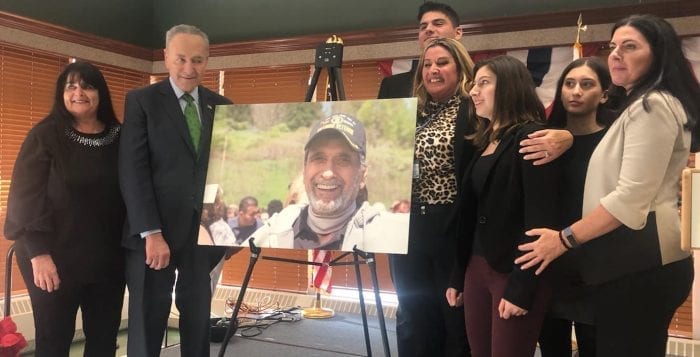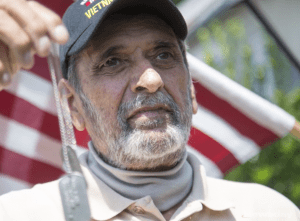Lawmakers and Vietnam Vets Continue Liver Fluke Battle

Before Vietnam vet Jerry Chiano of Valley Stream died in 2017 after battling a rare form of bile duct cancer, he fought to raise awareness by urging Vietnam vets to get tested for liver fluke exposure. The tiny worm, found in Southeast Asia, can be transmitted to humans after they eat raw or uncooked fish. The parasite lives in the biliary system and is the known cause of bile duct cancer.
“It’s such a crazy disease,” said Chiano’s daughter, Jennifer Paglino. “My father wanted other people to know about it, so they’d get the treatment and benefits they deserve.”
Chiano’s awareness campaign garnered the support of researchers at the Northport VA Medical Center, who concluded that same year in a pilot study that one in four local Vietnam vets who ate raw or uncooked fish while deployed were exposed to the parasite.
U.S. Sen. Chuck Schumer (D-NY) sounded alarms in late December, stating the study remains largely unused. He’s urging the VA to look seriously at the issue and Northport VA’s work, noting that benefit claims for the disease have increased sixfold since 2003, while 80 percent of the claims submitted in 2015 have been denied.
The VA is conducting the Vietnam Era Veterans Mortality Study, a national effort that will look at data from everyone who served in the military during the Vietnam era, from Feb. 28, 1961 through May 7, 1975, and compare mortality rates for all ailments, including bile duct cancer. Results for that study are pending.
The agency did not say if that study would dictate whether or not bile duct cancer is considered a service-related disease.
Representative Lee Zeldin (R-NY-1) said he hopes the VA’s new large-scale research mission “will pave the way for infected veterans to receive the treatment they have earned.”
Schumer is demanding that the Northport research be used.
He noted that the situation raises questions about the VA process for acknowledging service-related illnesses and how its researchers use the statistically based science of epidemiology, which links exposure to disease.
The VA website clearly states that liver fluke exposure can cause bile duct cancer. Yet, a VA spokesperson said in an email that the Northport research is flawed, while discounting the risks.
“The VA is not aware of any studies that show that bile duct cancer occurs more often in U.S. Vietnam veterans than in any other group of people,” he stated.
Schumer pointed out how the VA initially found in 2009 limited evidence to suggest that exposure to Agent Orange and other herbicides during the Vietnam War caused Parkinson’s disease. Months later, it reversed its decision and added the disease to the list of covered conditions connected to exposure to herbicide agents.
Schumer and the entire Long Island congressional delegation — Zeldin, Tom Suozzi (D-NY-3), Peter King (R-NY-2) and Kathleen Rice (D-NY-4) — have urged the VA to study the issue.
“Local vets, some of whom are already sick, need reassurance that these studies lead to answers on service-related health claims, while others have passed away while fighting for awareness and VA testing,” Schumer stated.
As the VA embarks on another large-scale research mission on toxins and environmental exposure, Schumer underscores the importance of using the Northport data.
“We have samples, antigen markers and more; there’s good stuff here from this smaller study, but it is largely sitting on a shelf, as we are here today to say: use what’s useful,” he said.
However, the VA bluntly states: “No future VA studies will utilize data from the Northport VA Medical Center’s pilot Liver Fluke study …”
In an email, the VA spokesperson explained that the Northport VA liver fluke study relied on a test used in Asia, where the disease is prevalent, which is not FDA approved. It also noted, among other things, that the Northport VA study lacked control groups. Plus, he said, none of the patients who tested positive for liver fluke exposure actually suffer from bile duct cancer.
Gerald Wiggins a Vietnam vet from Port Jefferson Station took part in the Northport VA liver fluke study and was one of 12 veterans found to have been exposed to the parasite. He does not have bile duct cancer, but he said he had two bile duct cysts removed in September 2017 at Sloan Kettering.
The disease, he said, is a ticking time bomb. He can’t understand why the government isn’t supporting veterans. At 71 years old, he said it’s late for him. But he believes every veteran who served in Southeast Asia and areas prone to the parasite should be tested.
“Ten people came down with Zika virus in Florida and within two weeks the federal government gave $600 million to fight it,” he said. “As a vet, I laid my life on the line and got nothing.”
He submitted a VA claim, which he said was denied. His other insurance picked up the tab.
George Psvedos, an infectious disease specialist and a Northport VA physician, conducted the study. The Northport VA was unsuccessful in gaining clearance for an interview from the VA. But, as noted in his research conclusion statement, his study was the first to show evidence of exposure to liver fluke in U.S. soldiers deployed in Vietnam. He called for more research to examine the link between a Vietnam exposure and the likelihood of veterans developing bile duct cancer.
Currently, no validated test for liver fluke infection is available for clinical use in the United States, according to the VA website. And the Centers for Disease Control and Prevention is not recommending serological testing for exposure, the VA said.
The Northport VA said that if veterans express concerns or symptoms of bile duct cancer, the VA screens them right away.
Meanwhile, the prognosis for bile duct cancer is poor, with a 30 percent five-year survival rate, according to the American Cancer Society.

As for Chiano, he ultimately died of an esophageal bleed, his daughter said, caused by throat cancer induced by exposure to Agent Orange.
“He thought he was going to die of bile duct cancer,” said Paglino. “We thought [his dying of Agent Orange exposure] was his way of making sure that my mother received VA benefits after he died.”
Survival benefits for veteran’s families are extended when a veteran’s disease is considered service related. Veterans enrolled in VA health care are eligible for VA-provided cancer care, the agency said.
“VA encourages all veterans who feel their military service has affected their health to submit a claim, which will be adjudicated using the latest scientific and medical evidence available,” said VA spokesperson Susan Carter.
Suozzi is also still following the issue.
“At minimum, we owe Vietnam veterans answers on whether they were exposed to cancer-causing parasites while serving, and the Northport VA’s study nearly two years ago was an important step in confirming that,” he said. “This data could prove instrumental in ensuring affected veterans are taken care of nationwide. I strongly urge the Veterans Administration to include this important study in their future research or, at least explain in detail why they will not.”
Photos from Jennifer Paglino






